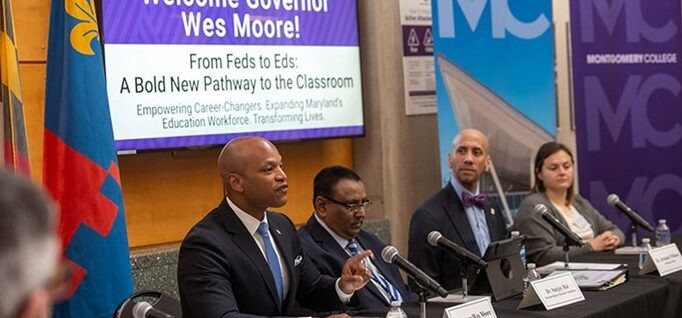Opening doors for displaced federal workers
By Tabitha Whissemore
July 30, 2025
When the Trump administration began massive layoffs of federal workers earlier this year, community colleges jumped in to help displaced workers prepare for new careers.
Northern Virginia Community College (NOVA) announced NOVA next (New Employment, Exploration and Transition) in March. The program enables unemployed federal workers and federal contractors to enroll in select courses at no charge and access online workshops on resume writing and job search techniques.
NOVAnext has gotten a lot of interest. Following the announcement, the college has received approximately 1,200 inquiries about the program, with around 470 people applying. Already, 300 dislocated individuals are taking courses.
Many of the inquiries came from people who anticipate losing their job as layoffs continue, as well those who have accepted the option to resign their employment at the end of September.
NOVA President Anne Kress describes the Northern Virginia region as “tight-knit.” Most people who inquired about NOVAnext learned about it through word of mouth, she said.
Serving the region
The program not only helps dislocated workers, but also supports talent retention for the region, Kress says.
“We don’t want that talent migrating out of the region,” she says.
The courses build skills for in-demand jobs in the region, including IT, project management and artificial intelligence.
But for someone who has spent a career in the public sector, switching to the private sector can be difficult. According to Kress, in a survey of individuals interested in the program, about 80% expressed interest in career coaching, which includes interview preparation and resume building.
NOVAnext participants receive that help, including meeting with private sector mentors for one-on-one coaching. They also have access to NOVA’s food pantry, mental health services, libraries and more.
Using existing tools
NOVAnext wasn’t created from scratch but rather uses tools the college already had in place and “rearranges them” so the college could “build a new response for an emerging situation,” Kress says.
Many of the classes are included in the Virginia FastForward program – an accelerated workforce initiative that offers financial assistance to Virginians pursuing industry-recognized credentials and certifications.
NOVA found $1 million internally to cover part of the cost for participants who don’t qualify for financial assistance.
“Community colleges are connected to the needs of our community,” Kress says. “This is at the heart of what we do.”
The college has had a lot of support from business chambers, local workforce boards and more in promoting the program and providing support and resources, according to Kress. In June, Kress received the Northern Virginia Chamber’s Impact Award for Workforce in recognition, in part, for her role in launching the NOVAnext.
Employers also have shown support. NOVA will announce employer partners for the program soon.
More importantly, feedback from NOVAnext participants has been positive. Kress says people appreciate the opportunity to build industry-recognized skill sets. One person also commented that they feel “incredibly supported” at NOVA. The program, says Kress, is a “morale booster.”
A pathway to the classroom
In Maryland, the Feds to Eds program is helping displaced federal workers prepare for a new career in the classroom.
Maryland – like most states – is experiencing a shortage of K-12 teachers, particularly in STEM subjects and world languages. Since 2006, Montgomery College (MC) has trained teachers through a rigorous, fast-paced Alternative Certification for Effective Teachers (ACET) model, designed for degree-holding professionals seeking a career change. MC and Montgomery County Public Schools (MCPS) are collaborators on the program.
ACET has now been adapted to focus on recruitment and training of displaced federal workers. ACET Flex: Feds to Eds was announced at the end of May by Gov. Wes Moore, who also announced a $100,000 Teacher Quality and Diversity Grant for the college to help with restructuring the ACET program.
Montgomery County is one of the top counties for federal unemployment claims and teacher vacancies, according to Deidre Price, senior vice president for academic affairs/college provost. But MC is a “solution-finder,” Price says.
The first Feds to Eds cohort started in June. This group of about 20 displaced federal workers – many with doctorates and decades of work experience – are “bonded in a unique way” because of their experiences, Price says. They formed an “instant community.”
The group meets Tuesday and Thursday nights and some Saturdays. They are learning how to build lesson plans and use technology in the classroom and learning about adolescent development, among other things. It’s a mix of credit and non-credit courses.
Some will start teaching in MCPS classrooms this fall already, even as they’re on the path to a teaching certification.
The program is designed to move people “quickly and confidently” into the classroom, Price says, and participants have “all but guaranteed employment.”
There’s more to the story! Read the full article in CC Daily.


